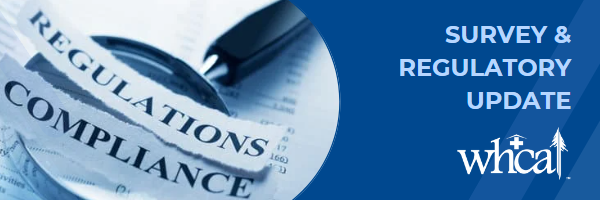What is an Oversight Nurse, and Do You Need One in Your Assisted Living?
October 2023
While the term “oversight nurse” is not defined in statute or rule, many assisted livings employ or contract with a registered nurse (RN) to serve in this capacity. This article aims to clarify what the role of the “oversight RN” entails, to ensure intermittent nursing services are provided with the proper level of nursing care.
Anytime an assisted living chooses to offer one or more intermittent nursing services there must be systems in place to ensure these services are provided within the nurse practice regulations outlined in WAC 246-840. It is imperative that the nurse, whether an LPN or RN, work within his/her scope of practice as delineated in the standards of nursing conduct or practice and the functions of a registered nurse and a licensed practical nurse.
Because an LPN cannot provide nursing care independently, the assisted living needs an RN involved to provide or oversee any nursing care provided in the facility (perhaps this is where the term, “nurse oversight” originated). It is feasible to outline this RN’s role (whatever title is used) focusing on WAC 388-78A-2320, intermittent nursing services systems.
There are times when only an RN can complete nursing functions. Those times include:
- Conducting the initial and ongoing assessments of a resident’s nursing needs, whenever a resident requires intermittent nursing services; and
- Developing and making necessary amendments to the nursing component of the negotiated service agreement, whenever a resident requires intermittent nursing services; and
- Implementing and amending the nursing component of the negotiated service agreement, whenever a resident requires intermittent nursing services; and
- RN delegation; and
- Supervising qualified/trained caregivers in carrying out delegated nursing functions; and
- Supervising an LPN’s or other RN’s nursing functions.
There must be a way to reach the oversight RN in the event any of the above services are needed, and a system in place to ensure those services are completed timely and completely. Of course, the RN duties listed above may be split between or amongst RNs; in this case, it is important that staff know which RN to contact and when.
As with any role, it seems that the role of the RN in assisted living has expanded over the years. This might be due to resident/family expectations, company policies, the influence of state agency staff, or a combination thereof. Many RNs, whether working full time or part time, employed by the assisted living or contracted, are involved in much more than what is deemed required and necessary by the definition of “intermittent nursing services.”
Many facilities, for instance, instruct staff to call the RN for any resident change in condition, whether that resident needs intermittent nursing services or not. Many facilities expect the RN to conduct and/or review incident investigations. RNs might be expected to complete all the resident assessments and negotiated service agreements, even those who do not require intermittent nursing services. Many facilities expect or assign the RN to oversee the entire medication delivery system. None of these duties fall into the realm of “intermittent nursing services.” And although the RN can certainly fulfill these duties, it might not be feasible and/or cost effective to have an RN provide this level of service.
The role of the LPN is not to be discounted; LPNs are the backbone of many assisted living companies and are vital to the ongoing quality of resident care. For residents needing intermittent nursing services, the LPN can work within his/her scope of practice and collaborate with the RN in determining the best ways to deliver that nursing care. Outside of the intermittent nursing services system, the LPN generally serves a leadership role in assisted livings and oversees much of the day-to-day operations of the wellness center. Coordination of resident care with doctors, home health, hospice, and other medical services typically falls within the role of the LPN. Initial and ongoing assessments (excluding nursing assessments) and the development/amendments/implementation of the negotiated services agreements (excluding the nursing portions) might be a huge bulk of the LPN’s work. Training and overseeing care staff, offering medication system guidance, educating residents and families, and arranging and following up on health-related services are also key to a facility’s smooth operations.
There are important and distinct roles of RNs, LPNs, and qualified/trained caregivers in assisted living. It seems that many companies have gotten creative in addressing each of these types of healthcare providers to their maximum scope while keeping costs down for residents. The role of the “RN oversight” is one of those creative endeavors.
For questions about assisted living, email Vicki McNealley or call her at 1-800-562-6170, extension 107.

